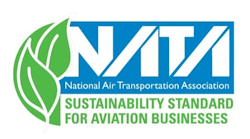Over the last ten years, the sharing economy has grown exponentially, making many services more accessible, affordable and convenient through digital technologies that provide many services on-demand. Uber and Lyft innovated the rideshare industry that was formerly dominated by taxicabs and airport shuttle services. Air BNB disrupted the hotel industry by giving vacationers options and homeowners the ability to make extra income. If regulatory agency, industry and legislative opposition is a sign of the next innovative transportation mobility disrupter, then we all need to learn more about Peer-to-Peer (P2P) car sharing and its potential future impacts on airports everywhere.
The concept for peer-to-peer sharing is already prominent in housing, boating and lending industries. Applying this strategy to personal vehicles by using a simple platform where an owner can list their vehicle, set the price and arrange transfer of the keys is like a Craigslist ad for sharing cars. TURO, GetAround and Avail are the United States leaders in P2P car sharing, innovating how your neighbor, visitors and vacationers choose to travel. Vehicles are available via an app as needed, without the expense and responsibilities of car ownership and as an alternative to traditional car rental services.
Sharing Around the World
Currently TURO, the market leader, operates in every state but New York, 56 countries, 5,500 cities including the United States, Canada, the UK and Germany. Getaround operates in 300 cities, seven countries and according to the latest numbers, boasts five million users.
A recent study by Frost & Sullivan found more than one million car share users began using this new technology between 2010 and 2011. By 2017, the study tracked ten million P2P users and the authors predict by 2025, the numbers will reach 36 million. Presently, Western Europe leads this market, followed by the United States. As with any new technology, airports, cities and states face challenges to regulation, implementation and consumer protection.
Legislating This New Technology
The research from the National Conference of State Legislatures shows eight states approved P2P car sharing legislation in the last decade. California, Colorado, Indiana, Maine, Maryland, Ohio, Oregon and Washington all built frameworks specific to address this unique transportation system. In West Virginia, the state legislature approved a feasibility study and will be voting on the results of that study this session.
Not all states adopted the same framework; the majority of states who passed legislation, require minimum insurance liability coverage at three or more times the coverage required for a private vehicle while the remaining three states allowed the minimum coverage to be equal to that of a private vehicle.
In a much-needed move for consumer protection, half of those states required vehicles to have complied with all safety recall failures. Airports in Colorado, Maryland and Ohio required concession license agreements, while Indiana airport commissioners were given the power to regulate P2P at their airports.
Impacts to Cities, Airports and the Rental Car Industry
The effects of the rise of P2P car sharing were first felt in rental car heavy markets, with initial legal actions filed in 2016 by Miami, San Francisco, Dallas/Fort Worth, Denver, Tampa and Phoenix Sky Harbor international airports. Today as P2P popularity increases, it has continued to spread to airports and cities across the country.
P2P car sharing is the latest to attempt to carve out a niche in the lucrative airport transportation market, facing similar confusion as Transportation Network Companies (e.g. Uber and Lyft) experienced, regarding airport licensing, concession fees and permits to operate on airport property.
Traditional multi-fleet car rental operation is a $30-billion-a-year industry. These companies, Enterprise Rent-A-Car being the largest in the United States, pay airports concession licenses, permits and fees in order to operate at an airport. Passengers either walk to designated parking areas adjacent to the terminal or their shuttles deliver travelers offsite where the rental agreement is signed and the car is checked for damage before keys are exchanged.
Enterprise is leading the charge with lawsuits around the Country, urging airports to regulate, license, permit and levy fees to P2P operators, since they are competing as traditional rental car providers. One key difference according to lawyers for the P2P industry, is the rental car companies do not pay sales tax on their fleet while owners participating in P2P car sharing pay taxes on the purchase of their vehicle. P2P industry lawyers argue that in order to “level the playing field” traditional rental car companies need to pay sales tax if P2P is to be regulated and taxed in the same manner.
At many airports, ground transportation and other services provided on airport property result in revenue generation and are regulated by the airport operator. Ground transportation and rental car providers at almost all airports pay fees to be able to do business, either through a fee associated with each trip into the airport, a fee for each transaction or a percent of gross revenues.
Turo and other P2P companies claim that they are simply technology providers who are connecting people and are exactly like the arguments initially made by Uber and Lyft. However, these P2P car sharing companies are facilitating the rental of a vehicle and directly competing with rental car companies, without the same regulations and requirements that leads to an unfair advantage.
More and more airport operators are dealing with this growing trend and attempting to regulate P2P companies, institute fees and issue permits to allow them to conduct commercial activity on their property, just like traditional rental car companies and ground transportation operators already do. Likewise, many cities and counties levy taxes on rental car operators for doing business within their jurisdiction and expect any company that conducts business to pay taxes in exchange for operating a commercial business that charges fees to its customers.
In addition to fee issues, the airport location of where the P2P transaction occurs can be problematic. Typically, P2P transactions between vehicle owners and renters takes place on the terminal curbsides, in parking lots or garages, or airport roadways. When transactions happen along roadways or the terminal curbside, it can lead to increased congestion and safety concerns.
Also, it takes extended time for the P2P transaction to be completed, which usually encompasses drivers walking around the vehicle to look for damage, discussing the vehicle operations and other interactions, in addition to loading luggage into the vehicle. Understandably, this takes longer than a typical curbside passenger drop-off or pick-up and creates additional issues.
This increased dwell time adds congestion to already overburdened airport terminal curbsides and may result in a second curbside trip as the owner of the vehicle is picked-up after the transaction is complete. Sometimes owners also leave vehicles in parking areas with the keys left on the outside of the vehicle, taking up parking spaces that could be used by other travelers, and potentially for a longer duration. This can impact parking revenue and can create a target for thieves within airport parking areas which can increase other theft at the airport and compromise traveler safety.
Airports with consolidated rental car facilities provide direct curbside service to the rental car companies located in the facilities in exchange for fees. The rental car operators choosing not to be located in the facility are typically required to pick-up and drop-off passengers at those facilities rather than on the terminal curbside in order to ensure they do not receive any advantages over those companies paying for direct service.
Airports around the globe remain at the forefront of traveler ease of passage and safety, as well as advocating and embracing innovators and entrepreneurs. It took lengthy negotiations before ridesharing or Transportation Network Companies like Uber and Lyft were accepted in cities and airports across the world. P2P in this country is currently in its infancy in terms of State and Local agencies who are attempting to define and fairly regulate this growing industry. Freedom of enterprise and technological innovation will continue to challenge and disrupt traditional methods and costs of travel.
Even if the impacts are not yet seen at all airports, now is the time to begin putting the framework in place to plan for and regulate these P2P services. This includes issuing permits, determining a fare and fee structure based on existing rental car agreements and, if the service is allowed, designating specific locations where transactions can take place safely and without disrupting traffic. Potential locations that could be considered include at the designated curbside pick-up areas used by off-airport rental car operators or parking area within a consolidated rental car facility or within an identified area of an airport parking lot or garage. Underutilized parking spaces, potentially at the back of lots/garages or in remote lots, could be assigned for this use. In exchange for paying transaction fees, lockboxes could be provided with codes for renters to facilitate the transactions and reduce incidences of theft.
Thomas Rossbach, AIA, ACI s is national aviation practice consultant and vice president for HNTB. He provides strategic direction for projects within the national aviation market and has nearly 35 years of terminal planning, design, and airport P3 development experience. He can be reached at [email protected].
Jessica Wyatt serves as HNTB’s national aviation planning sector leader and has 24 years of experience in transportation and airport facilities planning. She has worked at more than 35 airports across the country and is an industry leader in airport ground transportation and landside facilities planning and operational analysis. In recent years, Wyatt has been studying the influences of newer TNC services, emerging services such as Peer-to-peer car sharing, and the dawning of autonomous technology. She can be contacted at [email protected].






